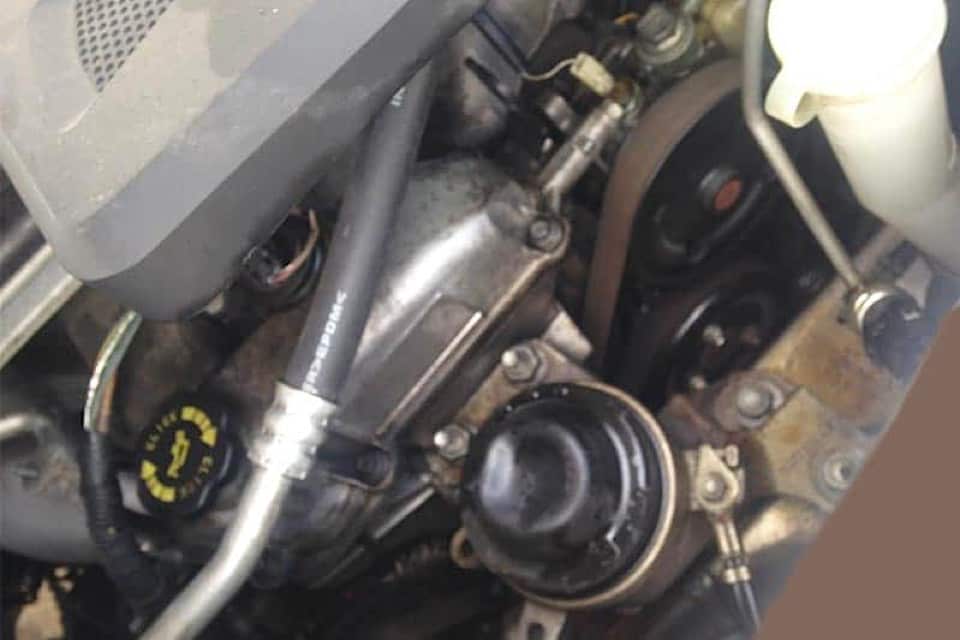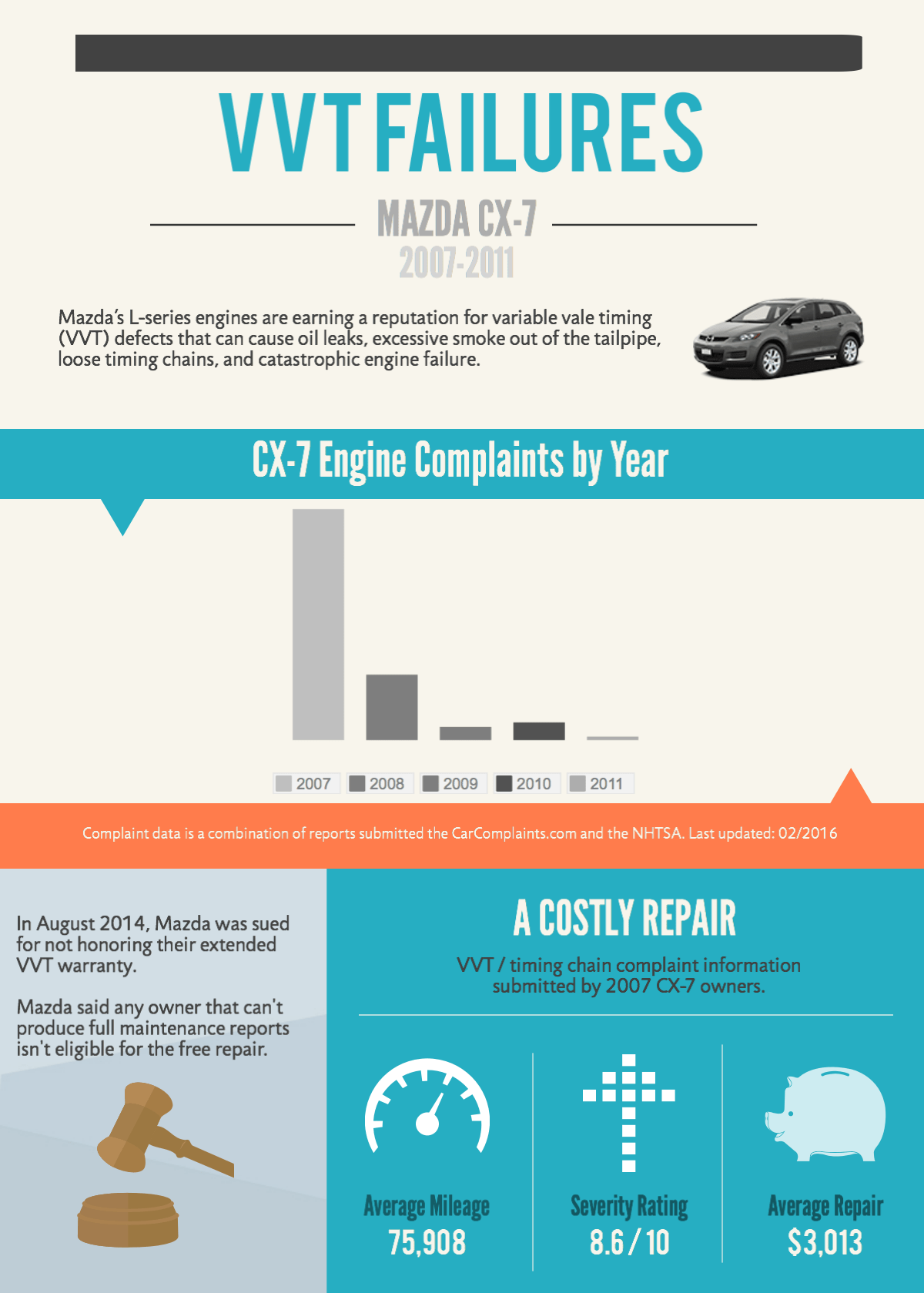Is Mazda Still Refusing Variable Valve Timing (VVT) Repairs?
- Variable valve timing defects in Mazda L-Series engines are to blame for oil leaks, loose timing chains, and catastrophic engine failure.
- Owners might first notice VVT problems as a loud ticking noise during startup.
- Mazda extended the warranty for certain vehicles and was later sued for not honoring that warranty.

Mazda’s L-series engines are earning a reputation for variable vale timing (VVT) defects that can cause oil leaks, excessive smoke out of the tailpipe, loose timing chains, and catastrophic engine failure. Mazda acknowledged the problems in a “special service program” but, according to owners, has denied warranty coverage in many cases.
What is Variable Valve Timing (VVT)? ∞
Valves control the flow of fuel, air, and gasses in your engine. They are an integral part of internal combustion which can be broke down into 4 key phases:
- Intake: the engine takes in a precise mixture of air and fuel.
- Compression: the pistons in the engine compress that air-and-fuel mixture.
- Combustion: the pressure generated by compression is transformed into power.
- Exhaust: the combustion gasses are released through the exhaust.
For phase 1 there’s an intake valve. For phase 4 there’s an exhaust valve. Both need to be opened and closed with precision, hundreds of thousands of times.
Early on, valves opened and closed for a specific amount of time only. That is wasteful and advances in engine technology now allow the timing, lifting, and duration that valves are left open to all be tweaked.
Variable valve timing (VVT) uses technology to control the opening and closing of your engine’s valves in an effort to increase fuel economy, generate more power, and/or limit emissions.
Mazda’s Issues with VVT ∞
Automakers all use a variety of VVT systems, but they all come with one thing — complexity. In Mazda’s case, a defect with the VVT has been known to lead to specific and costly problems:
- When first starting the engine, a loud ticking can be heard from the VVT. This is due to wear and tear on the VVT.
- While driving (under 2,000 RPM), excessive stretching of the timing chain can cause a knocking / rattling noise.
Left untreated these problems can lead to oil leaks, stretched out timing chains, and catastrophic engine failure.
Models Most Affected ∞

The VVT Extended Warranty ∞
Because of VVT problems, Mazda issued a “special service program” to extend the vehicle’s warranty to 7 years from the original start date, or 70,000 miles (whichever comes first).
"Mazda Motor Corporation has decided to conduct a Special Service Program (SSP) to extend the warranty coverage for the specific repair of variable valve timing (VVT) noise and/or timing chain noise concern, on certain 2007-2010 CX-7 vehicles equipped with L3T engine and produced from February 14, 2006 through February 26, 2010, and 2007-2010 Mazdaspeed3 vehicles equipped with L3T engine and produced from June 28, 2006 through February 27, 2010, and 2006-2007 Mazdaspeed6 vehicles equipped with L3T engine and produced from August 4, 2005 through June 30, 2007."
Mazda said it would replace the VVT actuator, or both the VVT actuator and the timing chain, free of charge if:
- The mechanics were able to determine that the VVT or timing chain is worn
- The owner can produce a comprehensive review of vehicle maintenance (showing sufficient oil changes and never using an engine oil of viscosity lower than 5W-30
Mazda Sued For Not Honoring Their Extended Warranty ∞
The extended warranty means nothing if Mazda refuses to do the repairs.
In August, 2014, Mazda was sued for refusing to repair continuous variable valve timing assemblies in its L-Series engines. According to the lawsuit:
- The defect can cause the timing chain to detach and destroy the engine
- Mazda issued a technical service bulletin (TSB) and a special service program (SSP) about the problem
- The company has refused to make necessary repairs under the extended warranty
Mazda doesn’t dispute the first two points, but things get a little hairy with point number 3.
In the lawsuit, lead plaintiff James Stevenson says he was refused warranty repairs even though he ”regularly maintained the vehicle by performing his own oil maintenance.”
Mazda says without any maintenance records, they can’t honor his warranty.
Do any of you change your own oil? Do you guys write up your own “maintenance records?” Yeah, exactly.
Mazda Filed (And Won) a Motion to Dismiss the VVT Lawsuit ∞
Mazda says their extended warranty is clear:
"if the (problem) is caused by poor vehicle maintenance (insufficient oil changes or using engine oil of viscosity lower than 5W-30), this warranty extension does not apply."
Because Stevenson couldn’t produce any records, Mazda says there’s no way to know if the car was properly maintained.
On 07/13/15, in the US District Court of New Jersey, Stevenson agreed to dismiss the action.
Lawsuits Regarding This Problem
Lawsuits about this problem have already been filed in court. Many times these are class-action suits that look to cover a group of owners in a particular area. Click on the lawsuit for more information and to see if you're eligible to receive any potential settlements.
Stevenson v. Mazda Motor of America Inc.
Case Filed
Mazda Motor Corp. will have to answer if the 2009-2011 Mazda3 and Mazda6 have dashboards that melt in the sunlight and cause occupants to be blinded due to a reflection from the dashboard.
Generations Where This Problem Has Been Reported
This problem has popped up in the following Mazda generations.
Most years within a generation share the same parts and manufacturing process. You can also expect them to share the same problems. So while it may not be a problem in every year yet, it's worth looking out for.
1st Generation CX-7
- Years
- 2007–2012
- Reliability
- 34th out of 36
- PainRank™
- 11.43
- Complaints
- 144
Further Reading
A timeline of stories related to this problem. We try to boil these stories down to the most important bits so you can quickly see where things stand. Interested in getting these stories in an email? Signup for free email alerts for your vehicle over at CarComplaints.com.
Mazda’s L-series engines have a reputation of variable vale timing (VVT) defects that can cause oil leaks, excessive smoke out of the tailpipe, loose timing chains, and catastrophic engine failure.
Other than that they're great. Unfortunately a judge has granted a motion to dismiss a VVT lawsuit after Mazda argued their extended warranty terms are clear:…
keep reading article "L-Series Engine VVT Lawsuit Dismissed by Judge"Well, that didn't take long. Just a couple months after a VVT lawsuit was filed in court, Mazda has filed a motion to dismiss the case. Their reason?
…
keep reading article "Mazda Tries to Get Around VVT Lawsuit with Sketchy Rules About Oil Changes"Defective variable valve timing (VVT) assemblies in L-series engines has sparked a new class-action lawsuit against Mazda.
That'll come as welcome news to owners – particularly those with a CX-7 – who have been complaining for years about VVT and timing chain issues.…
keep reading article "Lawsuit Accuses Mazda of Hiding Timing Chain and VVT Defects in L-Series Engines"